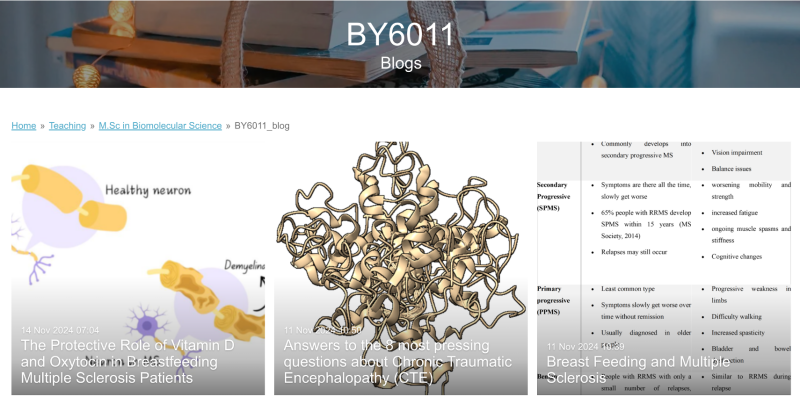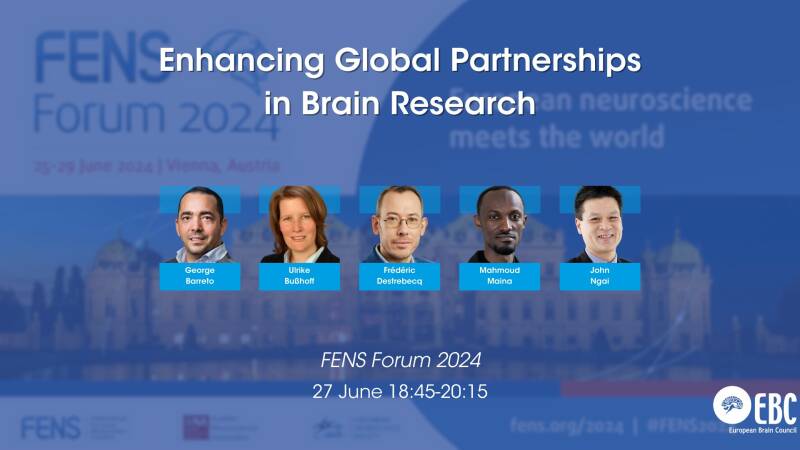Merry Christmas and Happy New Year!!! Wishing you a season filled with joy, love, and happiness. Here's to a wonderful year ahead! 🎄✨🎉
As part of the learning process for our MSc in Biomolecular Science students, one of the activities involves creating a blog post based on a clinical case. The primary goal of this exercise is to encourage students to translate complex scientific concepts into clear, accessible, and engaging content suitable for a non-specialist audience.
We warmly invite you to explore the blogs created by our students! If you have any questions or suggestions, please feel free to leave your comments. Your feedback and diverse perspectives are invaluable for enriching the learning experience and fostering an exchange of ideas between students and readers.
Link: https://www.barretolab.org/teaching/m-sc-in-biomolecular-science/by6011/by6011-blog


As part of the pharmacology course, the students conducted in silico experiments to investigate how hormonal compounds may interact with their respective receptors. One of the course activities involves translating the highly technical data obtained from these experiments into content that is both accessible and inclusive for scientific and non-scientific audiences alike. The students were tasked with creating a graphical abstract (GA) to effectively communicate their findings, with an emphasis on clarity and precision in conveying the information to diverse audiences.
Can you please help us in evaluating the graphical abstracts available on the page below? Should you wish to provide input, you are also very welcome to vote and leave comments for the abstract that you believe presents the information most clearly for a general audience. Thank you so much!
Link: https://www.barretolab.org/teaching/by4037/by4037-graphical-abstract24

We're excited to welcome Zoha, Manuela and Rhyan to our lab as they begin their FYP!
Looking forward to seeing all the great ideas they'll bring to the team.
On September 9th, our student Andrew McGovern successfully presented his PhD Viva titled "Hormone Therapy in Precision Medicine: A Preclinical Exploration of Interactions between Tibolone, Sex, and Gonadal Hormonal Deprivation in the Brain". As part of his PhD in Biological Sciences (Neurosciences) at the University of Limerick, Andrew's research explores how tibolone, sex and hormonal changes affect the brain. His findings offer important insights that could help shape future treatments for neurodegenerative disorders, contributing to the growing field of precision medicine. His work reflects a strong commitment to advancing our understanding of brain health.
*** Congratulations, Andrew!!! ***
Our new paper is out!!!
In collaboration with Miguel Borda, Dag Aarsland & team, this study reveals anthocyanins may improve cognitive function in individuals at high risk for dementia! In a randomized, placebo-controlled trial, we explored the effects of anthocyanins—powerful antioxidants—on cognitive function in people at elevated risk for dementia, based on their inflammation levels. Results showed that after 24 weeks, individuals with high inflammatory biomarkers experienced significant cognitive improvements when treated with anthocyanins, compared to the placebo. This finding highlights the potential of anthocyanins as a personalized intervention for those with chronic inflammation, offering new hope in the fight against dementia.
Link: 10.1016/j.exger.2024.112569

FENS Forum in Vienna, here we go! We are very much looking forward to it!
Postdoctoral candidates interested in applying for the MSCA Postdoctoral Fellowship 2024 at the University of Limerick (Ireland)

Are you a motivated postdoctoral candidate ready to take the next step in your professional journey? The Neuroendocrine Pharmacology lab (www.barretolab.org) is excited to offer support to a postdoctoral researcher applying for the Marie Sklodowska-Curie Postdoctoral Fellowship Programme (MSCA-PF) at the University of Limerick (Deadline: September 11, 2024).
Our group is dedicated to uncover early biomarkers of endocrine aging that could predict metabolic dysfunctions observed in neurodegenerative diseases like Alzheimer's. To achieve this, the candidate will leverage advanced data analytics, utilizing massive datasets from patients, animals, and cells to discover potential biomarkers and validate findings through experimental assays in the laboratory. We're seeking an ideal candidate with expertise in cutting-edge fields like artificial intelligence (machine learning), deep learning, mathematical modelling and systems biology. Proficiency in clinical data analysis, statistical methodologies, and hands-on experience in wet-lab techniques would be highly advantageous.
By joining our team, you'll become an integral part of a dynamic international network, collaborating with esteemed research groups from Ireland, Norway, the UK, Spain, and Chile. Active involvement in network-led studies and the opportunity to undertake a secondment in one of our partner groups to contribute to shared project objectives are strongly encouraged.
Who can apply?
We welcome applications from exceptional researchers worldwide who hold a doctoral degree by the call deadline, with up to 8 years of full-time postdoctoral experience. Candidates should have a PhD in Bioinformatics, Data Science, Computational Biology, Biostatistics, or related fields, showcasing demonstrable research proficiency in the specified areas. Geographic mobility is a prerequisite; applicants must not have resided in Ireland for more than 12 months within the last 36 months as of the call deadline.Application process
-
Please submit your CV, including personal information and academic record.
-
Prepare a concise one-page research proposal aligned with our group's research interests (barretolab.org)
Express your interest by June 30th via email to George.Barreto@ul.ie.
Don't miss out on this incredible opportunity to propel your research career forward and contribute to groundbreaking discoveries in neuroendocrinology and aging research at the University of Limerick!
Further Information
Post doctoral research roles are considered advanced research training roles as part of the Researcher Career Framework. The purpose of this advanced research training role is to conduct a specified programme of research under the supervision of a Principal Investigator while continuing to develop skills and competencies with respect to the role and future career options.
Benefits at the University of Limerick
Employees of the University of Limerick receive a variety of benefits including:
-
Supported professional development under the Researcher Development Programme and Staff Training Programmes.
-
Membership of the Public Sector Single Public Service Pension Scheme.
-
Membership of the Income Continuance Plan
-
The opportunity to join the University’s Additional Life Cover
-
Coverage in the UL Sick Leave Scheme (available under “S” on the HR A-Z)
-
Flexible working practices such as the Shorter Working Year Scheme.
-
Preferential rates for health insurance.
-
Employee wellness is a priority and a number of initiatives take place each year for the benefit of UL employees, see more at Be Well at UL.
-
Preferential rates for access to the UL Arena swimming pool and fitness centre.
Equal opportunities at the University of Limerick
The University of Limerick is an equal opportunities employer, is committed to selection on merit and to the developing and maintaining a positive working environment, in which all employees are treated with dignity & respect. In pursuit of this, it is the policy of the University to provide all employees with an environment, which is free from bullying, harassment or victimisation of any form. You can read more about UL’s commitment to equality diversity and inclusion here.
Researcher Development
The University of Limerick Researcher Development Programme gives researchers an opportunity to develop and enhance the skills, knowledge and attributes necessary to complete their research and longer term career ambitions.
Enhancing Global Partnerships in Brain Research | 2024 FENS Forum Networking Reception
We are very excited for this event at FENS in June!!!
Check it out: https://www.braincouncil.eu/event/enhancing-global-partnerships-in-brain-research-2024-fens-forum-networking-reception/

We are delighted to announce that Prof Silvia Costa from the Federal University of Bahia (UFBA) in Brazil will be joining our laboratory as a visiting professor. Dr Costa will be conducting research activities aimed at investigating the neuroprotective effects of plant-derived bioactive molecules with hormonal activity in an inflammatory model of astrocytes. These activities are part of an international collaborative project between UFBA and UL, which was recently funded by Brazil's National Council for Scientific and Technological Development (CNPq).

Two papers in one roll is fantastic! Our new research paper is OUT!!! In this latest study, Andrew explored the molecular landscape of the brain post-GHD to better understand hormone therapy (HT) effectiveness. Using a gonadal hormone deprivation (GHD) mouse model treated with Tibolone—a compound activating estrogenic, progestogenic, and androgenic pathways—he conducted a high-throughput proteomic analysis of the pre-frontal cortex. The findings unveiled an amazing reprogrammed response to Tibolone, especially within pathways crucial to neurodegeneration.
What's the importance of this study?
Our study underscores the necessity of precision medicine in HT administration, tailoring treatment to individual factors for optimal outcomes. By deciphering the molecular changes post-GHD, personalized interventions for neurodegenerative diseases may become a reality, potentially revolutionizing treatment strategies. Our study marks a significant advancement in understanding HT efficacy and emphasizes the importance of further exploration in this field.
Want to know more about this exciting research? Check this link: https://doi.org/10.1016/j.jsbmb.2024.106520

Our new paper is OUT!!! It highlights a fascinating discovery in neurobiology: male and female astrocytes exhibit distinct responses to lipotoxic damage associated with obesity. Led by Oscar Lanussa, this study suggests that high concentrations of palmitic acid (PA), a common fatty acid in obesity, pose a greater threat to male astrocytes' fate. Female astrocytes, on the other hand, display a stronger defense mechanism, potentially mediated by endogenous hormones. This groundbreaking finding underscores the importance of considering sex-specific factors in understanding brain health and disease.
Check it out: https://www.sciencedirect.com/science/article/pii/S0969996124000883?via%3Dihub

Our research group will be travelling to Turin to attend the 12th International Meeting Steroids and Nervous System. We are very excited to participate in this event! Italy, here we go :)

Our new review paper is out! We all know that dietary habits play a critical role in preventing neurodegenerative diseases, with omega-3 polyunsaturated fatty acids (PUFAs) like DHA, ALA, and EPA showing promise in promoting brain health. However, modern diets often lack sufficient omega-3 intake, and the effectiveness of fish oil supplements remains uncertain. With Dag Aarsland's team, we discussed the complexities influencing omega-3 PUFA interventions for dementia and cognitive decline, offering strategies for enhancing their efficacy and suggesting future research directions. Want to learn more? Check it out: https://www.tandfonline.com/doi/full/10.1080/14737175.2024.2313547

Our lab is happy to welcome Matas Merkelis, a recent graduate in medical biochemistry from the Lithuanian University of Medical Sciences.
Matas will be working on a project to identify early mitochondrial biomarkers of neurodegeneration in astrocytes and to implement a novel steroid treatment that can regulate mitochondrial inflammation in these cells. Welcome Matas and we hope you enjoy UL and Limerick!






